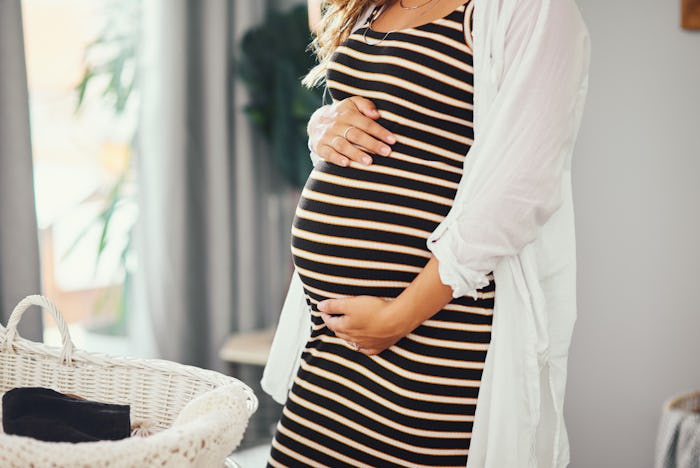Life

How To Deal With Coronavirus Anxiety If This Is Your First Pregnancy
Everything in the world is a lot different right now during the coronavirus pandemic, births included. In addition to normal birth-related fears, these trying times can cause extra worry for women who are experiencing their first pregnancy. Luckily, experts say there are several ways first-time pregnant women can deal with coronavirus anxiety.
Even if you were absolutely elated when you first saw that second line form on your pregnancy test, nearly every first-time mom will experience a few worries here and there throughout their pregnancy. Unfortunately, the novel coronavirus adds a whole new set of worries that just add to the stress of it all. "I really feel for pregnant people forced to navigate all this during an already often vulnerable and anxious time in many people's lives," Megan Davidson, author of Your Birth Plan: A Guide to Navigating All of Your Choices in Childbirth, tells Romper.
COVID-19 is a new disease, and the information public health experts have now can change tomorrow. "Uncertainty is a breeding ground for anxiety and there is a lot of uncertainty surrounding the coronavirus and pregnancy right now," Laura Jordan, a therapist specializing in maternal and reproductive mental health, tells Romper. "When definitive information is what we crave and we simply cannot get it, it's important to shift our focus to what we can control."
Davidson recommends finding simple ways to disconnect from the world and relax. "Surround yourself — virtually, social distancing is important — with people who you trust to answer your questions and help you feel as calm and confident as possible," she says. This is especially important on the day you give birth, as a growing number of hospitals are banning visitors and birthing partners to prevent the spread of COVID-19.
Deena Blumenfeld, childbirth educator and doula, tells Romper that pregnant women should be mentally prepared for all the possibilities. "Policies can change overnight and mothers need to be prepared to go it alone," she says. "Assuming you have the technology, set up video calls with your husband, partner, friend, doula, or whoever else you would have had with you during labor." She reminds moms to pack a charger and get the hospital's guest wifi login to keep your support person on the line as long as you need to.
Additionally, Jordan recommends bringing comfort items from home like a robe, your own pillow, or slippers. "The goal should be to increase your comfort as much as possible to counteract the very understandable feelings of anxiety," she says. "Also, in times of uncertainty, it's important to feel empowered, developing a strength-based mantra can help to accomplish this." For example, repeating "I can do this. I am strong. I am capable," can help birthing moms remember their power, she says.
Creating a birth plan is another step many expectant moms take to help feel more prepared for birth, and maternal mental health specialist Kirsten Brunner tells Romper that it is still crucial. Though it is also important to keep an open mind and be aware that it's possible that your labor and delivery may not go according to plan.
"Although expectant parents aren’t always sure how the birth will unfold, a birth plan helps them to feel more confident and in control," Brunner says. "Anything that an expectant mom can do to feel more in control, to feel like she is calling the shots, will help her to feel more empowered."
Although plans can still go awry even under the best of circumstances, Brunner says coming up with a reasonable birth plan and talking with your their doctor or birth professional can make giving birth during the coronavirus pandemic seem "a little less scary." And if you do find yourself in a position where you are worrying about having to give birth without the support group you imagined, remember that many women have given birth without their partners present, and you'd be in the company of some of the strongest, most incredible women out there. You got this.
If you think you’re showing symptoms of coronavirus, which include fever, shortness of breath, and cough, call your doctor before going to get tested. If you’re anxious about the virus’s spread in your community, visit the CDC for up-to-date information and resources, or seek out mental health support. You can find all of Romper’s parents + coronavirus coverage here, and Bustle’s constantly updated, general “what to know about coronavirus” here.
Experts:
Megan Davidson, Ph.D., labor doula, lactation counselor, and author of Your Birth Plan: A Guide to Navigating All of Your Choices in Childbirth
Laura Jordan, M.A., LPC, LMFT, licensed professional counselor and marriage and family therapist at Jordan Therapy Services
Kirsten Brunner, M.A., LPC, a maternal mental health specialist
Deena Blumenfeld, childbirth educator, doula, MPH candidate at University of Pittsburgh